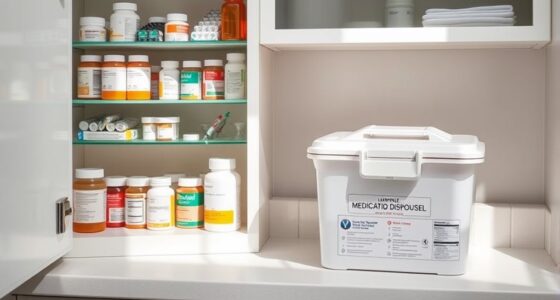To manage medications for seniors effectively, create a clear schedule with labeled pill organizers and set reminders. Keep all meds in one accessible spot, checking expiration dates regularly. Understand each medication’s purpose and communicate openly with healthcare providers about any side effects or questions. Track doses carefully and incorporate medication routines into daily habits. Staying organized and informed helps guarantee safety and adherence, and exploring more tips will give you even better strategies.
Key Takeaways
- Use clearly labeled pill organizers and set reminders to ensure timely medication intake.
- Keep all medications in one accessible, secure location away from children and pets.
- Maintain detailed records of medication names, dosages, and schedules for easy reference.
- Regularly review medications with healthcare providers and report any side effects promptly.
- Incorporate medication routines into daily activities to promote consistency and adherence.

How can seniors effectively manage their medications to stay safe and healthy? The key lies in establishing solid pill management routines and sticking to clear medication schedules. Proper pill management involves more than just remembering to take your pills; it means organizing, tracking, and understanding your medications to prevent errors and adverse effects. When you have multiple prescriptions, it’s easy to get overwhelmed or confused, but with the right strategies, you can stay on top of everything.
Start by creating a detailed medication schedule. Write down each medication’s name, dosage, and the specific times you need to take it. Use a pill organizer with compartments labeled for morning, afternoon, evening, and bedtime to physically separate your pills and make it easier to follow your schedule. This visual cue helps prevent missed doses or accidental double doses, especially if your memory isn’t what it used to be. Many seniors find that setting alarms or reminders on their phone or clock also supports adherence to their medication timetable. Consistency is vital because it guarantees your body maintains the right levels of medication, maximizing effectiveness and minimizing side effects.
In addition to scheduling, it’s important to keep your medications in a dedicated, easily accessible place. Avoid storing them in different locations that could lead to confusion. Keep all your pills in one spot, away from children or pets, and check expiration dates regularly. Discard any expired medications properly, and consult your pharmacist if you’re unsure how to do this safely. Implementing a daily routine—such as taking your medication right after brushing your teeth or during breakfast—can help make pill management a seamless part of your day. Using high-quality pill organizers can further improve your medication adherence and reduce errors.
Stay in close contact with your healthcare provider or pharmacist. Regularly review your medications with them, especially if you experience side effects or if your health conditions change. They can help you understand your medication schedule better and adjust doses if needed. Always ask questions if you’re unsure about how or when to take a medication, and never alter your doses without consulting your doctor. Remember, medication management isn’t a one-time task; it’s an ongoing process that requires attention and consistency.
Frequently Asked Questions
How Can I Help Seniors Remember to Take Their Medications?
Think of your loved one’s medication routine as a garden that needs regular watering. You can help them remember by setting up a pill organizer and using reminder systems like alarms or phone alerts. Encourage them to stick to a schedule and check their pills daily. Your support keeps their health blooming, ensuring they don’t miss important doses and stay on track effortlessly.
What Should I Do if a Senior Misses a Dose?
If a senior misses a dose, you should first check their medication schedule and assess if it’s safe to take the missed dose now or wait until the next scheduled one. Encourage medication adherence by setting reminders. If unsure, contact their healthcare provider or emergency contacts for guidance. Always keep emergency contacts updated, so you can quickly get assistance if needed. Don’t double doses unless instructed by a healthcare professional.
How Can I Organize Multiple Medications Effectively?
Think of managing medications like conducting an orchestra—you need everything in harmony. Use pill organizers to keep multiple medications sorted by day and time, making your medication schedule clear and easy to follow. Set alarms or reminders to stay on track. Regularly review your medication routine with your healthcare provider, ensuring all your medications are synchronized and effective. This approach helps prevent missed doses and keeps your health in perfect harmony.
Are There Specific Apps to Assist Medication Management?
Yes, there are several apps that can help you with medication reminders and dosage tracking. Apps like Medisafe, MyMediHealth, and Pill Reminder send timely alerts so you never miss a dose. They also allow you to log your medication intake, track your adherence, and even set refill reminders. Using these apps, you can stay organized and guarantee you take your medications correctly, giving you peace of mind and better health management.
What Are Signs of Adverse Drug Reactions in Seniors?
If your senior loved one starts experiencing dizziness or confusion after medication changes, watch for signs of adverse drug reactions. These may include unusual fatigue, nausea, or new allergies. Drug interactions can worsen these effects, making side effect detection vital. For example, a senior on blood pressure medication might develop a sudden rash. Stay vigilant, report any new symptoms promptly, and consult their healthcare provider to ensure safe medication management.
Conclusion
Managing medications for seniors is like tending a delicate garden—you need patience, attention, and care. By staying organized, communicating with healthcare providers, and using tools like pill organizers, you can help ensure your loved one stays safe and healthy. Remember, you’re the steady hand guiding them through their health journey. With a little effort, you’ll keep their well-being thriving, just like a beautiful garden in full bloom.









